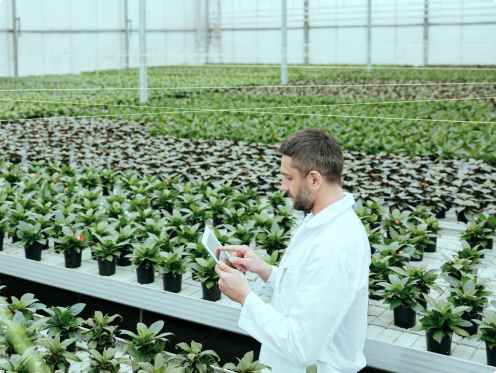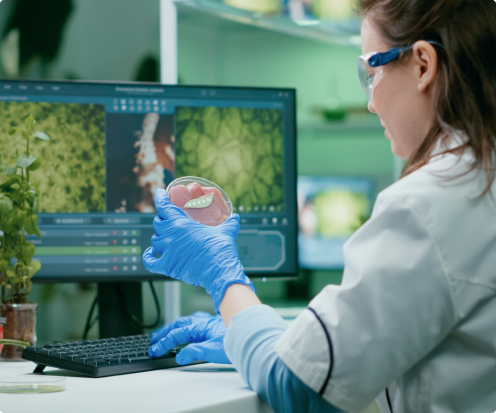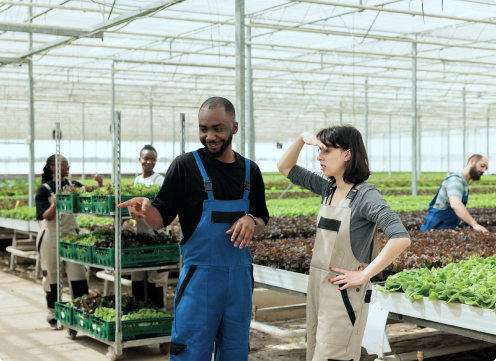Smart Farming Specialist
with AI Certification Program
Program Overview
This certification program is designed to train individuals in implementing AI-powered technologies within agricultural settings to optimize farm operations, enhance productivity, and improve resource management. By focusing on smart farming tools, IoT, AI applications, and data-driven solutions, the course prepares learners to meet the growing demand for technologically skilled professionals in the agriculture sector.
Duration
- 3 Months
- 180 Hours of Learning
- 15 hours per week (combining theoretical knowledge and practical application)
Program Highlight
- Comprehensive training in AI, IoT, and data analytics specifically applied to agriculture.
- Hands-on experience with smart farming tools and real-world data sets.
- Integration of AI techniques like machine learning, computer vision, and predictive analytics.
- Case studies from industry leaders in smart agriculture, such as precision farming and smart irrigation.
- Real-world projects to simulate farm data analysis and AI-driven decision-making.
- Industry-recognized certification upon completion.
Eligibility
- Minimum Qualification: Undergraduate degree in agriculture, computer science, engineering, or a related field.
- Preferred: Knowledge or experience in agriculture, data science, or engineering.
Job Roles
Smart Farming Specialist
Design and implement smart solutions for precision agriculture.
AI Agriculture Consultant
Use AI to provide data-driven solutions to farmers.
IoT and Data Analyst for Agriculture
Analyze IoT data and optimize farm operations.
Agricultural Data Scientist
Specialize in predictive analytics and AI applications in farming.
Farm Automation Engineer
Implement AI-based automation in agricultural settings.

Learning Objectives
- Understand the fundamentals of AI, machine learning, and IoT in smart farming.
- Gain proficiency in using AI models to analyze agricultural data for decision-making.
- Learn to apply IoT sensors for real-time monitoring of soil, crops, and weather.
- Develop skills in predictive analytics for crop yield, pest control, and resource optimization.
- Understand smart farming tools and techniques for water management, pest monitoring, and yield prediction.
Learning Outcomes
By the end of this course, learners will:
- Implement IoT devices for real-time data collection in agriculture.
- Apply AI algorithms to agricultural datasets for predictive analytics.
- Utilize smart farming techniques to improve resource efficiency and crop yield.
- Create AI-based models to predict crop health, optimize water usage, and manage pests.
- Gain the ability to integrate smart farming solutions within traditional agricultural practices.

Prerequisites
- Basic understanding of agriculture and data science.
- Proficiency in Python and knowledge of AI fundamentals (optional but beneficial).
- Interest in using technology to solve agricultural problems.
Equipment Required
- Laptop or desktop computer with internet access.
- Python installed (Anaconda preferred).
- IoT sensors (e.g., soil moisture, weather stations) for hands-on learning.
- GIS software (e.g., QGIS) and machine learning libraries.
- Access to datasets (provided during the course).


Training Methodology
- Blended Learning: Combination of live online sessions, interactive labs, and self-paced modules.
- Hands-On Labs: Practical exercises with IoT sensors, machine learning models, and data analysis.
- Case Studies: Real-life examples showcasing AI and IoT in agriculture.
- Live Projects: Final project focused on a real-world application in smart farming.
- Group Collaboration: Team assignments to promote peer learning and problem-solving.
Assessment Method
- Weekly Quizzes: Knowledge checks and practical exercises.
- Mid-Term Evaluation: Practical assessment using AI and IoT applications.
- Final Project: Comprehensive project analyzing a dataset and applying AI in smart farming.
- Certification Exam: Theory and practical assessment to ensure readiness for industry application.
Why Should You Take This Course?
This program provides an industry-oriented skill set, enabling professionals to enter the field of precision agriculture and smart farming. With a focus on AI and IoT, learners will be well-prepared to bring data-driven solutions to the agriculture sector, which is rapidly embracing digital transformation.
Who Should Take This Course?
- Professionals in agriculture looking to transition to smart farming.
- Graduates in agriculture, engineering, or computer science.
- Data scientists and engineers interested in agri-tech applications.
- Farm consultants and agribusiness professionals looking to integrate AI and IoT.
- Entrepreneurs seeking to launch tech-driven agricultural businesses.
Topics and Skills Covered
AI Fundamentals
Machine learning, predictive modeling, and computer vision.
IoT Applications in Agriculture
Sensor data collection, processing, and monitoring.
Smart Farming Tools
GIS, remote sensing, smart irrigation, and pest monitoring.
Data Processing and Analysis
Using Python and R for agricultural datasets.
Predictive Analytics
Crop yield prediction, pest control, and water management.
Agricultural Robotics and Automation
Autonomous tractors, drones, and robotic harvesters.
Case Studies Integrated into the Course
Case Study on Precision Farming with AI
Location: United States (Corn and Soybean Farms)
Integration: Week 5 (AI in Crop Yield Prediction)
Focus: Using AI algorithms to predict crop yields and optimize planting patterns in large-scale farms.
Case Study on Smart Irrigation using IoT and
AI Location: Spain (Olive and Almond Orchards)
Integration: Week 3 (IoT in Agriculture)
Focus: Leveraging AI and IoT sensors to monitor soil moisture and automate irrigation systems based on real-time data.
Case Study on Pest Detection with Computer
Vision Location: Brazil (Coffee Plantations)
Integration: Week 8 (Computer Vision in Agriculture)
Focus: Using computer vision to detect pests and diseases in coffee crops, reducing chemical use and improving crop health.
Case Study on Agricultural Market Trend
Prediction Location: Global (Commodity Pricing)
Integration: Week 10 (Market Trend Analysis)
Focus: Analyzing agricultural commodity pricing data to predict market trends and advise farmers on optimal selling periods.
Industry-Specific Examples
Example from Precision Agriculture
Industry Company: John Deere
Focus: Leveraging AI in autonomous tractors and field mapping to optimize planting and harvesting.
Example from IoT in Agriculture
Company: Climate Corporation
Focus: Using IoT devices for real-time monitoring of crop conditions, weather, and soil moisture.
Example from Agritech Startups
Company: Prospera Technologies
Focus: AI-driven crop monitoring using computer vision to enhance productivity and detect diseases.
Example from Agri-Finance
Industry Company: Rabobank
Focus: Using AI and data analytics to assess financial risk in agriculture, guiding farmers on crop planning and investment.
Case Study Integration Methodology
Each case study is integrated with a module, aligning theory with real-world application:
Case Study Discussions
Each module begins with discussions on specific industry problems, showing how AI and IoT have solved them.
Practical Assignments
Hands-on tasks allow learners to apply knowledge to case-specific challenges.
Final Project Inspiration
Case studies guide learners in choosing relevant topics and methods for their projects.

Detailed Syllabus with Hours per Topic (With Case Studies)
| Week | Module | Topics Covered | Hours | Case Study |
|---|---|---|---|---|
| 1 | Introduction to Smart Farming | Overview of Smart Farming, Role of AI and IoT in Agriculture, Industry Trends | 6 | None |
| 2 | IoT Sensors in Agriculture | IoT Sensors: Soil Moisture, Climate, and Crop Health, Data Collection Techniques | 12 | Smart Irrigation in Olive Orchards (Spain) |
| 3 | Data Processing and Preprocessing | Data Cleaning, Handling Missing Values, Data Normalization, Intro to Data Science in Agriculture | 12 | Data Processing for Irrigation Optimization |
| 4 | AI and Machine Learning Fundamentals | Intro to AI, Machine Learning Models, Regression, Decision Trees, Neural Networks | 15 | Precision Farming with AI (Corn and Soybean) |
| 5 | Predictive Analytics in Crop Yield | Building Models for Crop Yield Prediction, AI for Field Management | 12 | Crop Yield Prediction for Corn Farms (US) |
| 6 | Computer Vision in Agriculture | Basics of Computer Vision, Applications in Pest and Disease Detection | 12 | Pest Detection in Coffee Crops (Brazil) |
| 7 | GIS and Remote Sensing | GIS Mapping for Agriculture, Remote Sensing Techniques, Drones for Field Monitoring | 15 | Field Mapping with GIS and Drones |
| 8 | Agricultural Robotics and Automation | Autonomous Equipment, Robotics in Agriculture, AI for Equipment Optimization | 18 | John Deere Autonomous Tractors |
| 9 | Data Visualization and Analysis | Data Visualization Tools (Matplotlib, Seaborn), Dashboards, Storytelling with Data | 15 | Market Trend Prediction (Commodity Prices) |
| 10 | Market Trend Analysis in Agriculture | Agricultural Commodity Pricing, Supply Chain Analytics, Predicting Market Trends | 15 | Market Analysis for Commodities |
| 11 | Practical Project Work | Comprehensive Farm Project using AI and IoT, Data Analysis, and Report Preparation | 18 | Based on Case Study of Choice |
| 12 | Final Project Presentation and Review | Presentation of Final Project, Theory Exam, Practical Exam, Course Wrap-up | 12 | Final Project Presentation |